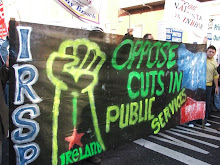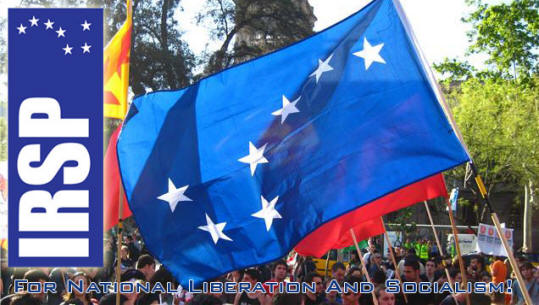In many of our activities as a Party we in the IRSP are often asked, occasionally in a hostile manner, but more often in a resigned but curious way,
“So What’s your Alternative to the Good Friday Agreement?”
Often as not the question is posed by supporters of the Provisionals or by ex members of that movement who simply walked away in disgust at the direction their movement had taken. It is a genuine question. It is one that requires a serious answer. And it is not a question to be answered in pubs and social clubs as former ex-combatants reminisce over a few pints and ask where did it all go wrong? That’s when the mixing can be begin and as the drink flows in so does the wit flow out.
Those who now are in the ascendancy - those who now walk the corridors of power when once they walked the streets in protest, can feel secure in the knowledge that there is no serious opposition to their hegemony.
The Administration At Stormont (TASS) has no serious parliamentary opposition. The pathetic little Alliance party is desperately trying to get the Ulster Unionist Party to give up the fruits of office and join them in opposition. But any opposition based on the Alliance or unionist perspectives would be a false opposition because they all fundamentally accept the prevailing economic policies pushed by the World Bank, the International Monetary Fund and the USA Government.
Of course there will be minor differences within TASS. The two main nationalist Parties PSF and SDLP will place more emphasis on “social justice” and “equality” while the unionist parties will emphasise issues s such as “law and order” and “economic stability” and “prudence.” When elections loom both sides will then revert to banging the big drum of nationalism of unionism to stroke up the sectarian flames and bring out their voters.
It is also most unlikely that a coherent electoral opposition could be established before the next elections to create a new TAAS. Any such opposition would have to be built on clear opposition to the economic and social policies of the current TASS. It would have to be socialist, have some prospects of success to generate support and have no illusions that there really is a parliamentary road to socialism. No organisation now existing would seem to have these credentials. Nor would there necessarily be agreement that such credentials would be essential. In other words all those on the left would soon find reasons to fall out with each other and denounce the SWP/SP/CPI/ etc as traitors to the class struggle.
So in the sense of parliamentary opposition it is true there is no alternative to the GFA.
But generally the question is not posed in terms of economic or social alternatives but in republican terms and is posed in such terms that really only two alternatives are allowed for - the continuation of armed struggle or settling for TASS.
Armed struggle in Ireland has a romantic tinge about it, particularly when posed in terms of heroic sacrifice or in terms of the heroism of the Easter Week uprising. Indeed it has almost achieved such status that to question its efficacy is akin to blasphemy. During the period of the seventies and eighties few dared to raise their voices within republican circles about armed struggle. To do so would be to invite all sorts of insults such as “sticky” or “peace lover” Ironic is it not that some of those most passionate about denouncing “Stickies” are the very ones who stole the “Stickie’s” clothes and now implement their policies.
So armed struggle was the tactic used to achieve the goal. Oh yes the goal! What exactly was that the armed struggle was for? Simple! The Socialist Republic! What does that mean? Don’t worry we will sort that out when we achieve it !! At least that was what the volunteers were told.
Yes indeed. There was in reality a lot of sloganising, a lot of passion, a lot of violence but little long term thought. Those who began to question, who raised awkward questions either about the armed strategy or the direction their leadership was going were sidelined, dismissed or killed in action. Consequently when the strategy of the long war began to look more and more threadbare and experienced volunteers became disillusioned there was little appetite for resistance to the new direction. Action had been all theory nothing. So when the action stopped Republicans were left bemused,
On the issue of the validity of armed struggle in the present day there is much argument but little clarity. Let us state clearly that as long as there is a British claim to sovereignty over any part of the island of Ireland there will always be republicans who regard it as perfectly legitimate to use force to resist that claim. That is a given.
However the question republican socialists would pose is it a viable tactic to use at this moment in time? Does it have any possibility of success? Are the balance of forces both nationally and internationally favourable to the pursuit of armed struggle. Are the forces of resistance well armed, trained, freed from informers and agents and capable of sustaining a campaign that would win popular support from the people of Ireland and be capable in the long run of forcing the British and Unionists to the negotiating table to hammer out a deal for better than the current deal encapsulated by the GFA and the St. Andrews agreement? The answer is obviously no.
Some may think that the unification of the various republican forces such as the INLA and the varying IRA’S could create a strong armed group capable of taking on the Imperialists. Not so. The political differences and analysis are so wide that it could not happen. Currently it is nearly impossible to get agreement on mounting pickets. No chance of agreement of running a war.
Also it needs to be stated clearly that the Republican Socialist analysis is such that it precludes a unification with others forces with very different approaches and policies. Our analysis is simply put. The class and national question are so intertwined that to pursue one without the other is to invite almost certain defeat. Following the defeat of the republican armed struggle and the temporary stabilisation of the six county state with its shaky TASS and coalition of four neo-liberal parties republicans must take a different direction. And clearly that direction is back to the class -the working class- for the James Connolly approach is as relevant now, if not more relevant than, when he was alive.
For at least the past 12 years we have been saying that the liberation of the working class is the task of the working class itself- that there can be no liberation without socialism. We have consistently argued against an elitist approach to the revolutionary struggle firmly basing our positions not only on Connolly and the great Marxist writers but also on our founder Seamus Costello and of course our fallen comrade Ta Power.
But of course if you read the writings of some of the “real” or “continuity” Marxists you would never know this. Take this piece of writing
“We have just come through a quite savage conflict. It seems to us that at a very minimum a new movement would have to offer some critique of the militarist strategy that led to defeat and also to have some orientation to the working class and at least initial expressions of class hostility to the Irish capitalist class and its role in advancing the imperialist offensive.”-
“A major problem over the past decade has been the reluctance of even quite sharp critics of the republican leadership to leave the republican family.
“Socialist Democracy 2nd April 2007 (http://www.socialistdemocracy.org/Correspondence/CorrespondRepublicanOpposition.html)The IRSP have offered a critique of the militarist strategy. We have clearly articulated our class position in our newspapers, our public meetings in this e-mail newsletter and in public conferences. A cursory search of our web site will confirm that.
And as regards the so-called reluctance to “leave the republican family”
we have also a very clear position on that. We deny there is any such thing as a republican family. Nor is there any such thing now as the “republican movement” What we say is there are differing republican traditions. We are the republican socialist tradition and we recognise there are other traditions such as the provisional republican movement and so on .We make no claim to be the republican movement. Such claims bear no relation to the class forces in Irish society or take account of the reality of capitalism or imperialism.
In the above-mentioned correspondence it is unclear if Socialist Democracy favour a break with Republicanism or see a new form of resistance arising from a break with provisionalism. There is however no room for ambiguity in the Socialist Workers Party’s guru Eamon McCann. Writing recently in the “radical Marxist revolutionary” newspaper, The Belfast Telegraph McCann in a critique of Gerry Adams speech at Edentubber gave his clear position
“Within the parameters of republican thinking, they have a point. And there’s the problem. Republicanism."
(http://www.belfasttelegraph.co.uk/news/opinion/article3164196.ece)
Sadly for Eamon and the Socialist Workers Party and all the other “real” socialists and Marxists, Irish republicanism for all its faults, (and we in the IRSP have been critical of those faults) is a revolutionary tendency that cannot be ignored or dismissed. We believe that it can form the core of any new revolutionary upsurge of the working class in Ireland against both imperialism and capitalism. Building such a movement is the real alternative to the Good Friday agreement. Join us in building that alternative.
Tuesday, December 9, 2008
Subscribe to:
Post Comments (Atom)


No comments:
Post a Comment